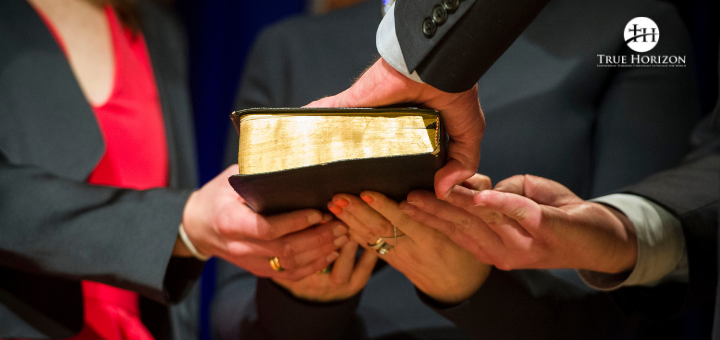Faith Doesn’t Save You
People misunderstand the concept of faith these days. Atheists mock it as a blind leap. To them, faith is nothing more than belief without evidence. Maybe even belief in spite of the evidence. Unfortunately, too many Christians play right into the atheist caricature. They say they don’t need evidence for their faith. They “just believe.” In fact, I have had some fellow Christians tell me that giving reasons for our beliefs demonstrates a lack of faith. Both groups have it wrong. Faith is not just mindless hoping. And it’s not an end unto itself. Faith is having the courage of your convictions. According to Christian doctrine, you have to have faith to be saved. But don’t be confused. Faith doesn’t save you.
Defining Faith
Faith has gotten a bad rap from atheists who equate it with mere belief. But the biblical concept of faith is nothing like that. Belief is nothing more than mental assent to an idea. But faith involves acting on that belief.
Big difference.
Think about it like this. You see airplanes flying over your head every day. Maybe you’ve read a book about flying. You’ve seen videos of airplanes soaring above the clouds. For all those reasons, you accept the intellectual proposition that flight is possible. You hold a belief that airplanes can fly.
But having faith means going beyond your belief that airplanes can fly. Faith means acting on your belief.
You get on an airplane.
This is an example of the biblical definition of the word.
Faith is active trust based on evidence
Having faith that airplanes can fly is great. But you have to step on an airplane if you want to go somewhere. Even so, stepping on the airplane isn’t enough to get you to your destination. You can have all the faith in the world in flying itself. But the airplane you’re getting on has to be able to deliver.
Misplaced Trust
Let’s say you want to fly to Jacksonville, Florida for vacation. What exactly are you placing your trust in when you step from the airport terminal onto the airplane itself? You’re trusting that the flight is going to the correct destination. If you mistakenly get on a flight to Jacksonville, North Carolina you will be sorely disappointed when you step off the plane (trust me). Getting to the right destination is the ultimate purpose of your flight.
You’re also trusting that the airplane is mechanically reliable. Owing to recent news stories, if you found out the airplane you were scheduled to fly on was a Boeing-737 MAX, it might cause you to rethink your faith decision.
Who’s Your Pilot?
Most importantly, you’re trusting that the pilots flying the airplane know what they’re doing. The co-pilot on the notoriously noteworthy crash of an Ethiopian Airlines 737 MAX in 2019 was a young man named Ahmednur Mohammed. Here’s how the Reuters news agency described him:
“The middle of three sons of a small business owner, friends from the sleepy eastern city of Dire Dawa remember Ahmednur as unusually driven to study … He spent five years at college studying his first love – architecture [but] feared he would not be able to make enough money as an architect to help his family … So he switched to aviation school and completed two years of training. Ahmednur amassed 350 flying hours and had just started living alone for the first time when the family heard his plane had gone down.”
Did you catch that? The first officer on the doomed flight had a total of 350 hours of flight time … in his life. That’s about the same amount of flight time a serious student could accumulate in four months.
The Object Of Our Faith
This is not to disparage the memory of Ahmednur Mohammed. Someone put that young man in a horrible position. Nobody on the planet is qualified to fly a commercial airliner filled with people after accumulating only 350 hours of flight time.
My point is that an act of faith, no matter how sincere or well-intentioned, does not guarantee that you will arrive at your intended destination. You have to place your trust in the right things. The decision to get on an airplane and go on vacation pales in comparison to the importance of a decision about your eternal destiny. But the same principles apply. What really matters is the object of your faith. Do you have evidence that it actually works? Is it reliable?
Is it true?
When you pursue an eternal destination the worldview system you choose to follow to get you there has to be sound. And the people you are leading have to be qualified and competent to guide you on the journey.
Be careful whose airplane you get on.
Faith Doesn’t Save You
Make no mistake. There are plenty of charlatans out there who claim to be Christian thought leaders. They may call themselves a “pastor” or “Bible scholar,” but they have no business piloting your flight of faith. In fact, the most dangerous ones may be those who seem to be trustworthy. They use the right words but they mean completely different things when they use them. My fellow apologist Alisa Childers has done a great job of exposing the dangers of so-called “progressive” Christianity on her blog/podcast. She learned it firsthand. The people who teach this brand of Christianity may be sincere. But their thinking makes them dangerous.
The culture we live in gives us all kinds of options for our eternal destiny. From Mormonism and its promise to be the god of your own planet to the empty annihilation that comes with atheist materialism, you get to make your choice. I am a Christian because I am convinced that the Christian worldview offers the best explanation for the way we find the world. It makes sense of every aspect of life. It points to a glorious destination. The core truths of the Christian worldview are sound and reasonable. You can trust them.
That’s why I believe that Christianity is true. And if it is, it teaches that you must have faith in Jesus Christ to be saved. It’s the only way to get where you’re meant to go. But having that faith doesn’t save you.
He does.





I understand what you’re saying about trust. We have multiple factors that support out trust in air travel, personal experience, we see planes fly overhead every day, our education, and so on and so on. Each additional element reduces the chance of mistaken trust.
What atheists don’t understand is what elements Christians use to secure their trust in the belief. We all need some method that protects us from beliefs that are false. How do Christians do that protect themselves from falsehoods?
Great question. I would say that Christians protect themselves from falsehoods just like everyone else does. We compare what we believe to reality itself. If what we believe matches the way the world actually is (it corresponds to reality), we can have confidence that our belief is true. This is called the correspondence theory of truth.
As an example: Modern science tells us that the universe had a beginning at some point in the finite past. That’s what reality shows. If Christianity is true, it would have to teach something that corresponds to that reality. As it turns out, the Bible teaches that the universe had a beginning (Genesis 1). So, the biblical view matches what we find in the real world on this point. At the very least, it doesn’t contradict reality.
That’s just one example. But the Christian view of the world also matches what we observe and experience about the design of the universe, the origin of life, the design and uniqueness of life, the existence of some kind of immaterial reality in living creatures (the Bible calls this the “soul”), and the moral nature of the universe. These are all pretty general. But Christian history also matches what we find in the archaeological and historical record.
My point is simply that Christianity is not just some feel-good psychological or emotional belief system. It actually does match the way the world is on many levels. That’s why I don’t say I believe it because it makes me feel good or because it “works for me.” I believe it because I actually think it’s true in a way that no other religious system can match.
There’s more to it (and more detail about it) than just that, but that’s how I would explain it in a nutshell. Thanks for asking.
How do you deal with the events and ideas in the bible that don’t match reality?
Can you give me an example? Do you mean things like miracles?
there is a different between trust and faith. Faith is indeed having blind hope that what you believe is true. Trust is having evidence that trust is built on that a play will fly and get you to your destination, at least more often than not. We have evidence that physics works and planes fly; we do not have evidence that there is a god or prayer works (witness the fire at Notre Dame in Paris).
Christians constantly attack each other, insisting that only their version is the “right” one. The problem is that you can’t show that this is true, no more than those you claim are wrong. And you try your best to claim that atheists are all about nihilism. Sorry, wrong again but I know saying such false things makes Christians feel that they are special.
There may be a difference between faith and trust in your mind. There may even be a difference in the culture at large. For that matter, I will even grant you that there are plenty (too many!) Christians who agree with you. But you don’t get to define words for others and then hold them accountable to your definition. I think I was pretty clear about the definition of faith I was using in the post. And I didn’t make it up for myself. I use that definition because that is the definition that is given in the Bible … so it’s the definition Christians should have of the word.
If you doubt me, I would challenge you to give me an example — anywhere in the Bible — where faith is described as “blind hope.”
Also, I’m not sure how a fire in a church in Paris negates the existence of God or the efficacy of prayer, but I’d be glad to entertain your argument to support those two assertions too.
It isn’t in my mind and yes, it is in the culture at large. And plenty of Christians agree with me, and you can’t show that they are less Christian than you.
We all get words defined for us. That’s what dictionaries are.
Hebrews 11 “11 Now faith is confidence in what we hope for and assurance about what we do not see.” Blind, in this context means what we do not see evidence for, which is what Hebrews is talkin about and what Jesus said when Thomas asked for evidence. Whomever the author of Hebrews was was indicated that we should have faith in what we don’t have evidence for. Further along in Hebrews we have it repeated that one must believe without evidence “and without faith it is impossible to please God, because anyone who comes to him must believe that he exists and that he rewards those who earnestly seek him.” It is interesting that the author of Hebrews mentions Gideon since Gideon did not have blind faith, repeated asking for evidence from this god.
Let me repeat … I’ve already admitted that the culture (and other Christians) may use the “blind hope” definition you want to use. But you don’t get to hold me accountable to that definition. I clearly stated the definition I’m using … which is why you are challenging me on it. I also challenged you to provide me an example of “blind hope” from the Bible. You’ve given three attempts but none of them work.
1) The Hebrews 11 passage you cite says nothing about “blind hope.” It says that “faith is confidence … [in] what we do not see.” Maybe that’s the reason for our difference. You want to equate evidence with “seeing.” But I don’t need to “see” something with my physical eyes to have evidence for it. I have plenty of evidence from science, history, archaeology, and philosophy that matches what the Bible says about all kinds of things. That’s a way of “seeing.” You do the same thing if you believe in the laws of logic, atoms, molecules, mathematical concepts, the Big Bang etc. You can’t see any of those things with your eyes, but you have confidence they are true because of some other kind of evidence. In other words, neither of us are operating on “blind hope.”
2) The example of Thomas is another variation of the same fallacy. Jesus was standing right in front of Thomas. He wasn’t lobbying for “blind hope,” and he didn’t lack evidence. He wanted MORE evidence than he already had.
3) Finally, you offer this quote: ” … and without faith it is impossible to please God, because anyone who comes to him must believe that he exists and that he rewards those who earnestly seek him.” This says NOTHING about relying on “blind hope,” or anything about evidence for that matter.
Yes, Hebrews 11 mentions Gideon. I’m not sure I know why you offer that as an example because it makes MY point. Gideon didn’t have “blind hope.” Neither did anyone listed in the Faith Hall Of Fame with him in the passage. Every single one of them acted in the way(s) they did in response to something God said or did that prompted them to demonstrate their trust in Him.
That’s because faith = “active trust,” NOT blind hope.
as for the fire in a church, do you think people are praying for it to be put out? If so, then why is it still on fire? This would hold the same for prayers for people to be healed, etc, It doesn’t work. All Christians have are excuses that this god supposedly can answer no and not yet or give another thing than what is prayed for. The bible says that all prayers are answered positively, quickly and with what was asked for, since a father would not give a son a snake if asked for a fish.
Nowhere in the Bible does it say that “all prayers are answered positively, quickly with what was asked for …” And there is no indication in the Bible that because someone might be praying for the fire in the Notre Dame Cathedral to be put out, that it will be. There may also be people praying that the place burns to the ground, just like people pray for the opposite outcome for many things. I think it’s pretty obvious that both those prayers can’t be answered in the affirmative simultaneously.
God is not a cosmic vending machine.
You can’t see emotions. You can’t see thoughts. You can’t see ideas or concepts like faith, yet, they are certainly real and their effects on the physical, seeable, touchable world are pretty evident.
I see schools and hospitals being built by Christians, I see them respond to every disaster, I see them feeding the hungry, clothing the poor and operating shelters for the homeless. I see them adopting orphans and caring for widows. They do so out of obedience and devotion to Christ and His command to love one another. That is real. That is seeable and that is evidence of many answered prayers. Furthermore, in a very real way, it is also a physical manifestation of the Holy Spirit – making God “visible”.
The atheist may exhibit all of the same behaviors and actions from some different motivation, but it does not negate work of God through His people. I choose to believe because I see God at work in people every day. I have seen Him at work in my own life too, turning a heart of stone into a heart of flesh, releasing me from bondage of addiction to tobacco that nothing else could free me from (niccotine replacement, hypnosis, will power, marathon running) and giving me purpose to daily living.
I have also had loss and disappointment in life. It is part of the human experience. Still, it doesn’t negate God’s work and supremacy. It only further points out my need for His help along the way.
As an aside, Notre Dame will be rebuilt – by God, chiefly through the actions and charity of Christians but likely also through the efforts of many athiests as well. God reigns over the Christian and the athiest alike- even though the athiest doesn’t understand it and thinks the very idea is foolishness. His will will be done despite the very active opposition that comes to steal, rob and destroy the athiest of his life and soul.
Perhaps one of our our primary jobs as Christians is to love athiests and help make God visible to them. Thanks for your work Bob.